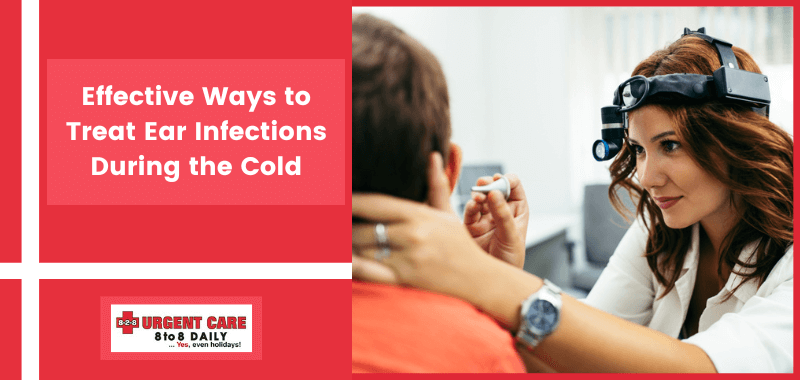


An ear infection, known as Acute Otitis Media, is a viral or bacterial illness affecting the inner, outer, or middle ear. It can be painful and leads to inflammation or fluid build-up in the ear canal. Children and adults are prone to ear infections during the cold season. The cold weather can affect the cartilage in our ears, causing it to remain cold and eventually leading to infections and earaches.
People who spend a lot of time outside can develop exostosis, a type of bone growth that can cause earaches. It can also restrict the ear canal and make it hard to drain water and clean ear wax.
Acute Otitis Media is one of the most common pediatric diagnoses in the emergency department. It can affect children from 6 to 24 months old. Around 80% of children experience some form of ear infection at some point in their lives, and approximately 90% have an ear infection before they start school.
Looking at the severity of ear infections in kids during the cold season, it’s essential to learn about their symptoms, causes, and treatment options.
Some of the common symptoms of ear infections in children include:
In toddlers and infants, some signs of this condition include crying more frequently, acting irritable, and having trouble sleeping.
If a white, yellow, or brown liquid or substance that isn't earwax seeps from the ear, it could be that the eardrum has ruptured.
Infections in the ear canal can cause high and persistent fever in infants.
This condition can be especially apparent in young children, especially when bottle-feeding. As the child swallows, the pressure in the middle ear changes, causing them to have less desire to eat.
Pain that lingers can lead to irritability. Poor sleep can also worsen the pain. The pressure in the ear can worsen when the child is lying down.
The inner ear bones are responsible for moving electrical signals to the brain. The fluid build-up behind the eardrums slows these signals down. It will lead to unresponsiveness to sound and voices.
A few common symptoms of ear infections in adults include:
The Eustachian tube is located in the middle ear and connects to your nose and upper throat. It usually helps prevent excessive fluid and air pressure buildup. However, if you have a cold, the contents of your nose and mucus can block it, causing discomfort and pain. Protecting your ears from cold weather may help decrease the severity of your ear congestion.
It occurs when viruses in your throat and nose enter your ear. The bacteria can then grow in the middle ear and cause inflammation. It can lead to various symptoms, such as ear pain, redness, and difficulty hearing.
Ragweed releases pollen during the months of August, September, and October. This pollen causes seasonal allergies and can also cause blockage in the Eustachian tube preventing fluid from draining and leading to bacteria formation. This, along with other cold infections, can cause soreness in the ear.
Persistent cold can cause inflammation in the nasal and sinus cavities leading to a poor sense of smell, headaches, and fatigue.
It can lead to hearing loss without proper ear protection. Infections can spread in the ear canals and restrict the canal's drainage.
Earaches can occur during winter, so here are some ways to prevent them.
You can cover your ears outdoors and dry them after swimming. Wearing a hat, ear muffs, or scarf may help. These items can keep your ears warm and dry.
You should avoid putting cotton wool or swabs inside your ears to help keep your Eustachian tubes free of congestion.
A mild earache treatment requires a doctor visit or over-the-counter medications. Earaches that last for more than a day should require medical attention.
Cold and wind can cause your ears to produce excessive wax. In most cases, improper cleaning can lead to the build-up of wax in the canal. Use a damp cloth or tissue to remove the wax. Cotton swabs may damage the eardrum.
Cold temperatures can also shorten the life of your hearing aids. They can also cause the batteries to wear out and let moisture build up. To keep them warm and dry, you can use a hat or earmuffs to keep them in place.
If you notice a change in your hearing or a red or swollen discharge, you should immediately consult an ear specialist (otolaryngologist) or audiologist to perform a hearing test and treat any issues that may arise.
If you have persistent earache that does not go away in a day or two, it is always advisable to consult an ear specialist. Home remedies might not help you with ear infections, and they worsen the ear infections. Do not go for over-the-counter medicines unless suggested by a doctor.
The ear treatment centers will help diagnose the issue correctly and identify the causes of earache. If not appropriately treated, earache can lead to hearing impairment and even hearing loss in children, particularly infants. Seeking ear infection treatment from the nearest urgent care center can help you avoid all these issues and keep your ears healthy.
If you or your child is experiencing ear infection symptoms that continue to worsen, you must seek immediate medical attention. At 8-2-8 Urgent Care, our team of experienced and highly trained medical professionals can help you get back to feeling well and avoid further complications. We are open from 8 am to 8 pm every day. Our team members will walk you through our self-check-in process during our regular hours. Contact us now or visit our urgent care clinic in Oceanside, CA today!